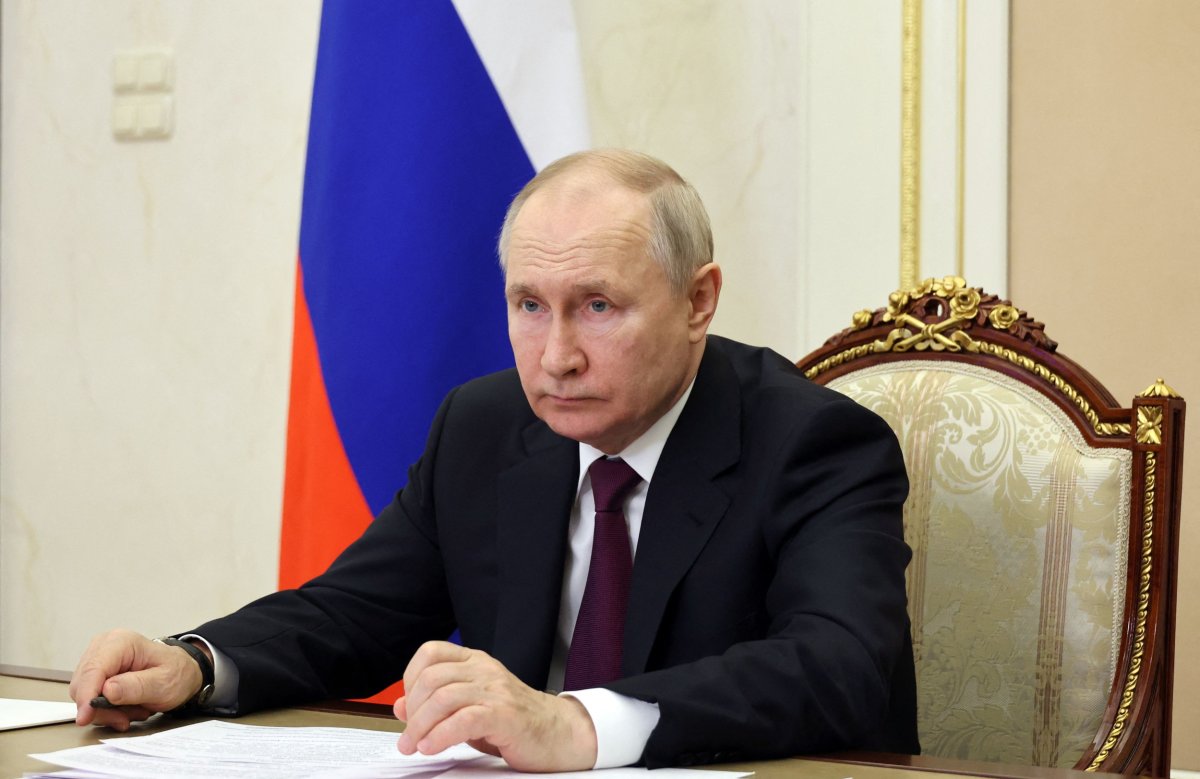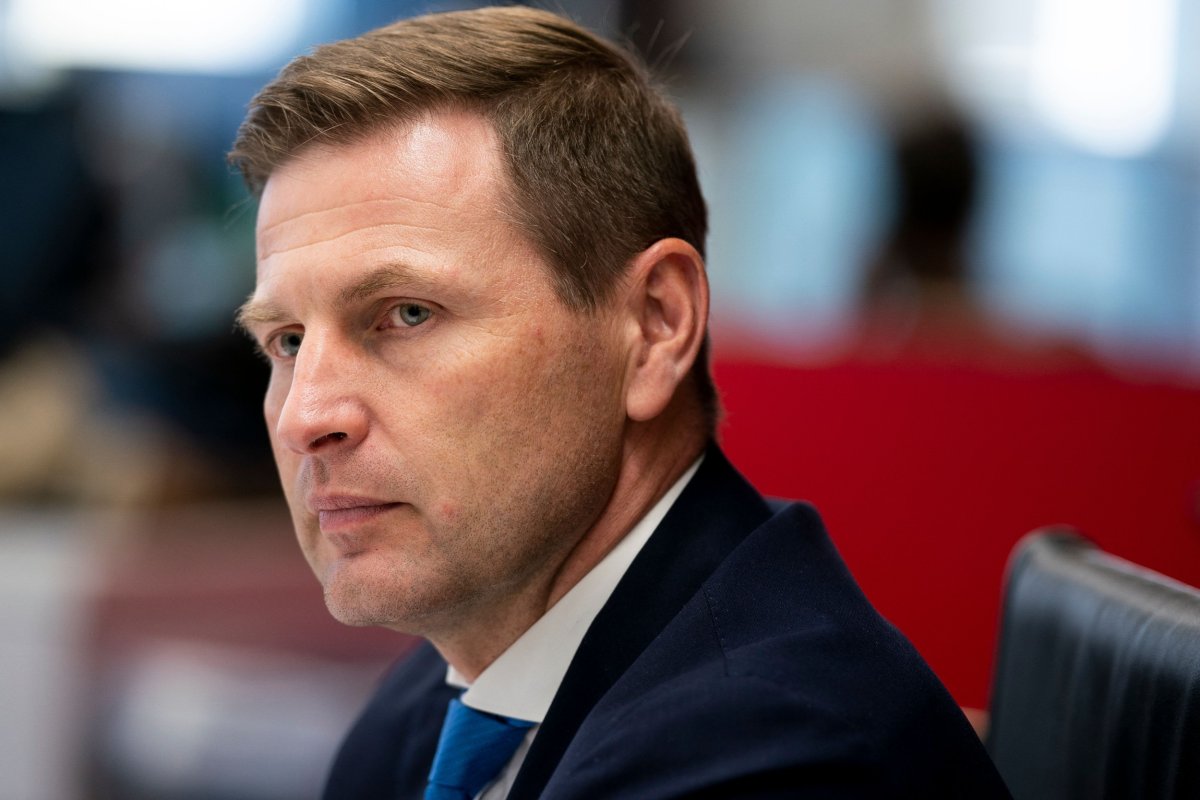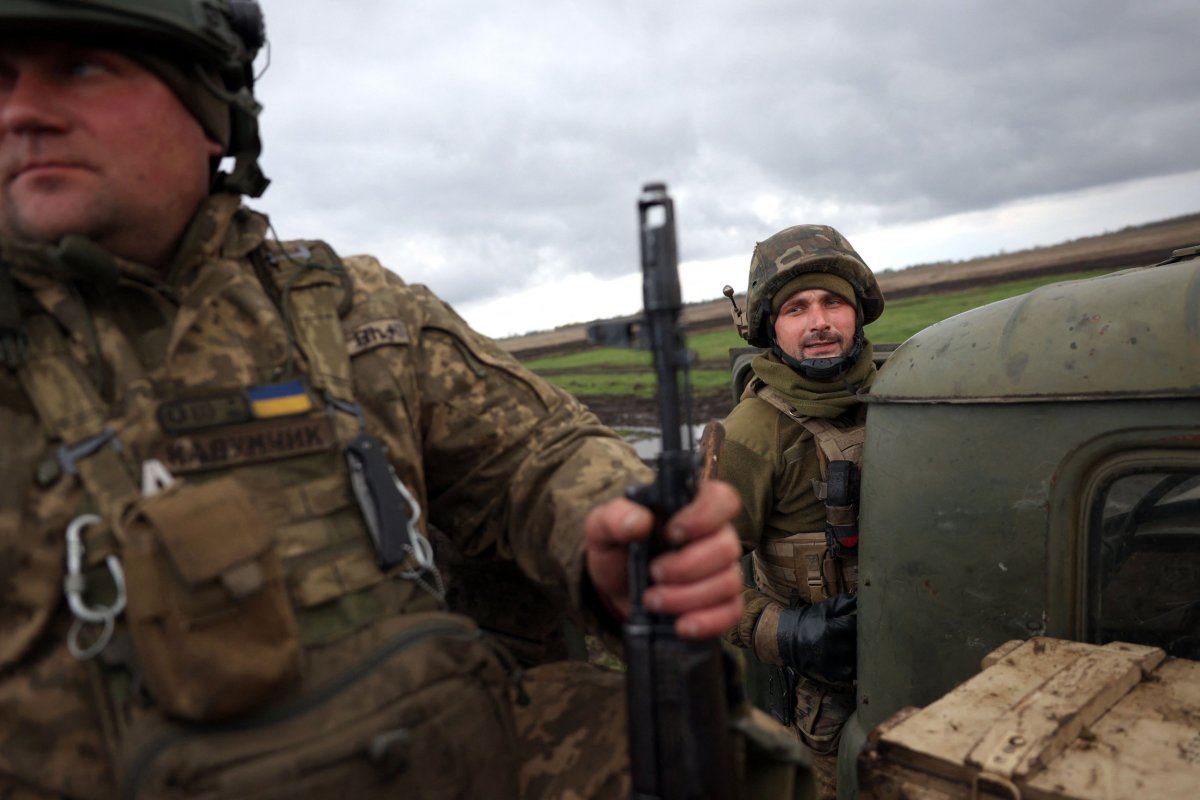Losing control of occupied Crimea is a "red line" for Russian President Vladimir Putin, the Estonian defense minister has said, though urged fellow NATO nations not to balk at a Ukrainian operation towards the peninsula regardless of fears over Moscow's nuclear arsenal.
In an interview at the Estonian Defense Ministry last weekend on the sidelines of the Lennart Meri Conference, Hanno Pevkur told Newsweek that NATO allies have channels by which to warn the Kremlin against nuclear weapon use and that Putin's repeated atomic saber-rattling should not undermine Western support for Kyiv.
"Our job here is to help Ukrainians and to be concerned that they can do their moves," Pevkur said. "Not to be worried about what the Kremlin will do."
Crimea occupies a particularly important place in Putin's national myth. Its quick and remarkably bloodless seizure by Russian troops—known then as "little green men" due to their lack of insignia or other identifiers—in 2014 was celebrated as evidence of Moscow's renewed confidence and capability and a reversal of a historic perceived national humiliation.

But Ukrainian troops may be looking toward the peninsula for their coming counteroffensive. A successful drive south from Zaporizhzhia and east from Kherson to sever the land bridge from Crimea to Russia could isolate the peninsula, and imperil the hundreds of thousands of Russian troops and civilians there.
Foreign officials have expressed concern that Kyiv's ambitions to retake the peninsula might prompt the Kremlin to escalate its war on Ukraine, though Western officials have also said there is no immediate indication that Putin is considering nuclear weapons.
"Ukraine needs to take back all the territories," Pevkur told Newsweek when asked about the Crimea issue. The peninsula's fate, he added, will be partially down to the Russian response to the coming counterattack.
"Will there be an avalanche? Will they start to run?...It is very difficult to say. When we talk about the same issue in maybe one month or two months, then we will have more information," he said. "But based on the public information that we have, then definitely Crimea is a 'red line' for Putin. But we don't know what that 'red line' means.
"We don't know, when we are in the stage that Ukraine is ready to take Crimea, what will be the situation or the current status of the Russian Army. Maybe there is nothing to fight against. Maybe the avalanche is big, and it will be a matter of months. Or maybe vice versa, and it will be a very long conflict."
Perhaps, Pevkur added, Putin may no longer even be the commander-in-chief.
"I believe the Ukrainians hope so," he said. "But when it's not Putin, it might be someone else with even more rage against the Ukrainians. You never know what the new leader will be like."
NATO and the United States have channels through which they can warn the Russian president against nuclear use. National Security Adviser Jake Sullivan previously warned there would be "catastrophic" consequences for Moscow if it did resort to weapons of mass destruction in Ukraine.
But NATO has refrained from publicly detailing the subsequent steps it might take, instead opting for "strategic ambiguity." Pevkur told Newsweek the approach is a sufficient warning for Putin.

"I believe that what NATO would do will never be published," he said. "And this is right because there are channels for that, to send the message to Russia regarding the nuclear threat, nuclear attack. And definitely, NATO and the allies will use these channels to send the right message."
As to whether this message had already been sent, Pevkur said: "There is no need to speculate. We have seen that Russia...poked the allies a bit. We saw that this threat stayed as a threat. It has to be like this, that when we want to achieve the real result, then we will not do that publicly. Especially not concerning the nuclear threat."
Snowball or Avalanche?
Pevkur is among those urging caution over the imminent—or perhaps already underway—Ukrainian counterattack.
"It is very important, we all understand that," the defense minister said. "But let's not put too much pressure on the Ukrainians with that. Yes, this is why we also trained Ukrainian soldiers in Europe, also here in Estonia. And this is why we are sending military aid to Ukraine...We need to hope that it will be as much successful as it can be."
"But to put everything into context, the frontline is 800-900 kilometers, the full contact line over 1,000 kilometers (about 621 miles), which is huge. Obviously, even when you have 12, maybe 13 new brigades, you still have more than 300,000 Russians.
"Every military understands that to have a very powerful counteroffensive, you need to have [a ratio] of 1:3 or 1:4 on your side," he said. "This is why I believe that we have to take it quite calmly, and not to put too much pressure on the Ukrainians. Let's see how it goes."
Ukraine will be hoping that Russia's mauled forces are unable to withstand the offensive. Leaders in Kyiv have made clear that a key goal of the attritional winter and spring defensive battles in the east has been to sap Russian strength.
"Definitely they lost a lot of their very good fighters, even in the first months of the war," Pevkur said of the Russians. "We all understand also that it's much easier to defend than to go on the offense. Even though the Russian Army has been cut down in scale, they still have hundreds of thousands of men there."
Newsweek reached out to the Russian Defense Ministry via email for comment.

"You cannot predict what might happen," the minister said. "The counteroffensive can be like an avalanche. If you have a snowball and you throw it down the mountain, it can turn into an avalanche. But it can also stay a snowball. We have to hope it will come out as an avalanche.
"And let's not forget, that cannot anyhow influence or affect our help to Ukraine, as the end goal for Ukraine is still the same: to win the war and to get back their territories."
In the meantime, Pevkur said, NATO nations should be digging deeper to equip the Ukrainians preparing to go on the offensive.
"Estonian military aid to Ukraine has been so far approximately $400 million," he said. "Which in Estonian terms is a bit more than 1 percent of GDP. We collectively have 54 countries in the Ukraine Contact Group Ramstein Format with a total GDP of around $50 trillion."
"When you take 1 percent of 50 trillion, it's approximately $500 billion. Up to today, collective military aid has been approximately $50 billion. It shows that we can do more. And definitely, Ukraine needs any help we can provide."
Uncommon Knowledge
Newsweek is committed to challenging conventional wisdom and finding connections in the search for common ground.
Newsweek is committed to challenging conventional wisdom and finding connections in the search for common ground.
About the writer
David Brennan is Newsweek's Diplomatic Correspondent covering world politics and conflicts from London with a focus on NATO, the European ... Read more
To read how Newsweek uses AI as a newsroom tool, Click here.








